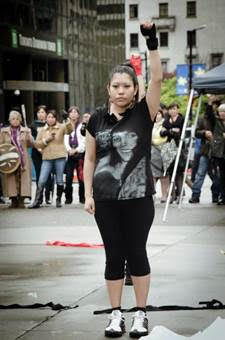By Lorelei Williams for the Canadian Media Guild
What can media do better in reporting on our missing loved ones?
Treat our missing women and girls the same as the others. It has been pointed out several times that when a non-Indigenous person goes missing, the media is all over it, but when it comes to our women and girls, not a lot of media care. They’re quick to label our women and girls as runaways, sex workers, drug addicts and drunks. This has got to stop. It makes it easier for people to dismiss our women and girls who are already less valued in the public’s eye, and insinuates that they deserve it.
Take the time to get the story right. I have done quite a few interviews and I’ve seen all the mistakes that have been made with both my family’s stories. There are no excuses to get it wrong.
Take Tina House from APTN News as an example. Working in BC, she is up against time because of the time zone difference. She has to have her story ready to go by 3 p.m. She does everything on her own. She is the camera person, journalist (interviewer), and editor. Other journalists have a camera person with them, and once they get the story they send it off to an editor. Tina takes the time to get her story right. She’ll call me a few times after the interview to make sure she’s got it right. There are others who do this as well but not many. Normally, when I do an interview with someone, I very rarely hear from them again. That’s where the mistakes are made.
The media has to stop using mugshots of our women and Robert Pickton’s photo. A lot of our Missing and Murdered Indigenous Women (MMIW) have children. They don’t need to see mugshots of their mothers all over the news and Internet. That stays there forever. I can’t stress enough how angry and upset I get when I see Robert Pickton’s photo. Just hearing his name gives me anxiety. Stop re-triggering our trauma!
The stories you publish stick with us forever. Whatever you put out to the public gets put on us as well. I don’t know how many times I’ve had to correct people about what they saw in the media. I have actually gotten into quite a few arguments with non-Indigenous men because of how they portray our women and girls based on what they saw in the media.
Look into some cold case files. These stories could jog some memories; there could be witnesses out there who don’t know it. With the cold case files we’re up against time because witness could pass away. This has happened with my family.
Find respectful ways to make it a story. These are human beings, our life-givers.
Any other advice?
When it comes to our MMIWG, racism runs deep. The Canadian society still doesn’t realize this is a huge issue in our country, right in their own backyards. Internationally, people recognize this, but not here at home. I’ve done quite a few speeches across Canada about the issue. It’s when I talk to people at restaurants, or public spaces that I realize they’re shocked to hear why I’m there. The first thing people ask is where I’m from, then they ask why I’m in their city. When I tell them, they say, “Really? This is an issue in our Country?” This happens all the time. There’s so much denial. Get the stories out there.
Also, know that as family members we are putting ourselves out there. We put our hearts on our sleeves when speaking to reporters about one of the most traumatizing moments in our lives. It’s very hard. We put ourselves at risk of being judged, attacked or criticized, or all three. When I agree to do an interview I’m emotionally drained after I’m done for the rest of the day. It never gets easier.
Report in a kind, considerate and respectful way. Put some focus on systemic issues such as residential schools and colonization.
You barely hear the good stories about our women, it’s always the bad stuff.
When you tell our loved ones’ stories, you’re helping us dig for answers. You could help solve some of these cases. YOU have the power to do that.
Be careful what story airs before our loved ones’ stories. I remember doing an interview then waiting for the story to air. I thought it would be at the top of the news cast because it had to do with the Missing and Murdered Women’s Inquiry. It ended up being the second story after a piece about dogs being locked in a car. That told me that dogs are more important than our missing and murdered Indigenous Women and Girls. I was very upset after seeing that.
Have a little more of an open mind. There are more important stories than Justin Trudeau accidentally bumping a woman in the House of Commons.
The MMIWG are REAL stories, about REAL people’s lives, and a REAL part of Canada. Have some respect for our women and girls because we matter.
[[{“fid”:”6199″,”view_mode”:”default”,”fields”:{“format”:”default”,”field_file_image_alt_text[und][0][value]”:””,”field_file_image_title_text[und][0][value]”:””},”type”:”media”,”link_text”:null,”attributes”:{“height”:340,”width”:225,”style”:”width: 100px; height: 151px; margin-left: 5px; margin-right: 5px; float: left;”,”class”:”media-element file-default”}}]]Lorelei Williams belongs to the Canada’s Indigenous Skatin (St’at’imc) First Nation of interior British Columbia from her mother’s side, and Sts’Ailes, BC from her dad’s side. She is dedicated to raising awareness of the horrific issue of missing and murdered Indigenous women and girls in Canada.
This story was originally published on the CMG website, and is republished with their permission.
Lorelei Williams belongs to the Canada’s Indigenous Skatin (St’at’imc) First Nation of interior British Columbia from her mother’s side, and Sts’Ailes, BC from her dad’s side. She is dedicated to raising awareness of the horrific issue of missing and murdered Indigenous women and girls in Canada.

